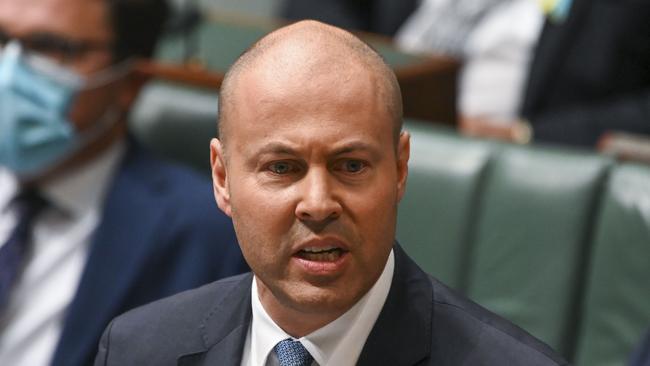Frydenberg trying to calm powerful international institutions, who expect the RBA to increase rates by 3pc over next 18 months


Powerful overseas institutions decided to fire a carefully targeted warning shot across the bows of Josh Frydenberg and Labor’s treasury spokesman Jim Chalmers.
They began dumping 18 month government securities – the market indicator of future Reserve Bank interest rates – sending the rate to three per cent.
The message was clear. The institutions are forecasting the RBA will be forced to increase its official interest rates and – therefore mortgage rate – by three per cent in the 18 months to September 2023.
Somewhat stunned Commonwealth Bank economists Martin Whetton and Gareth Aird – using conservative language – say such a rate rise would be “deeply contractionary” and would result in mortgage payments as a share of household income rising to record highs.
I would put it more bluntly. Such an interest rate rise would trigger a deep recession and a huge fall in dwelling and share prices.
It would make a complete nonsense of the latest budget.
I want to emphasise strongly that neither myself nor the CBA are forecasting such an event. Indeed the CBA forecasts that RBA’s interest rates rise will top out in the 1.25 to 1.5 per cent vicinity – levels that are manageable.
But the global message must be understood by Australians because its conveying a warning about a serious weakness in the budget and economy.
We have one of the most highly leveraged home owning communities in the world and, unlike the US, most of our mortgages are tied to flexible rates and even the fixed rate mortgages only protect for two or three years. An increase of just one per cent above a 1.5 per cent interest rate rise would create carnage, let alone further rate increases.
The US has many similarities to Australia – albeit being much larger. It has experienced a long period where globalisation, low cost energy, technology efficiencies, abundant labour, and many other forces created a benign low inflationary climate.
But there is now a fundamental set of changes that look set to be with the world for an extended period – labour is in short supply and rising in price, energy costs are rising, supply chains break down, and local costs no longer can be overcome by sourcing the product in China. The Ukraine war and China’s Covid-19 shut downs have intensified these trends.
US inflation is running around eight per cent and rising.
The Federal Reserve, after long periods of denial, have announced that they will start to seriously increase interest rates. The rates will need to rise sharply to have any impact.
Treasury has told Frydenberg that we can control inflation partly because higher commodity prices are boosting the dollar and wage increases will be moderate. They say that while the increase in the hourly wage rate in the 12 months to June 30 is five per cent it will slump to 3.5 per cent in the next financial year.
And that will happen because the CPI index, having risen by 4.25 per cent in 2021-22, will rise by only three per cent in 2022-23.
Those estimates look incredibly low given that the Treasurer is campaigning for higher wage rates and the core of the ALP campaign (and they are way ahead in the opinion polls) is for higher wages.
Australia has kept the lid on wages via a two tier society where skilled workers have done very well while unskilled and semi skilled have usually missed out. They are bleeding and very angry.
Frydenberg is trying to calm them with temporary measures but their anger is intensified when they watch the well-off boosting demand to allow price rises.
It is not my job to say that the Treasury are out of touch but the overseas institutions are conveying a crystal clear message – “you had better be right!”
If the Treasury’s low inflation figures are wrong and, say, a one per cent gap opens up between Australian and US interest rates (and is maintained for an extended period) then we will see the dollar fall, money leave the country and overseas investment reduced. We will have a tough time.
But if the Reserve Bank raise rates much beyond 1.5 per cent we will also be hit hard, according to our largest home lender, CBA.
The share market punts that Treasury is right and we have the most wonderful situation ahead – strong business profits, low interest rates by world standards. labour costs under control and restrained inflation. Shares keep rising. And all those doing well hope that the share market and Treasury are right. Those not winning want higher wages. They do not link their wage income needs with the cost to their mortgage.
But the overseas institutional shot across the bows of Frydenberg and Chalmers is a warning sign that the party that wins the next election should not forget.



Rarely in our history has the week leading up to a federal budget been so dramatic.